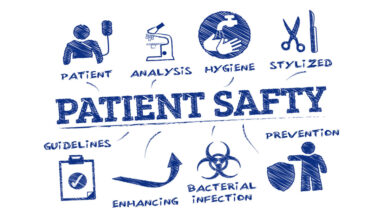Alzheimer’s Disease
Alzheimer’s Disease

God blessed humans by giving them brain, while animals live by their instinct. Human uses their brain for many functions that help him to live better life like thinking, understanding, reasoning, speaking, and making instruments and others. These processes carried out by having huge number of highly specialized cells that have interconnections to yield a perfect brain function.

Consultant Internal Medicine
at Al Ahli Hospital
What is Alzheimer’s disease (AD)?
It is a disease affecting the brain, resulting from replacement of the highly specialized brain cells with nonfunctioning proteins of unknown source causing decrease in number of effective cells and gradual loss in their capabilities and function performance leading to increasing disabilities and difficulty in performing daily life activities.
Who are liable to get AD?
AD can affect all ages, but most commonly seen after the age of 65 years, it is estimated that people above age of 70 will have 10% affected with AD, and it increases to 20-40% for those above 80 years.
Does AD affect certain people more than others?
AD studies show that it can affect both sexes and all races equally and there is no difference among people living in different social class or mode of life or life standards.
Are there any diseases that interfere with AD outcome?
Many diseases can alter and fasten the course and symptoms of AD like hypertension, hyperlipidemia, diabetes mellitus, and cerebrovascular accidents. ItMany studies also found that low fruit diet, low education level, low social class, and heavy metal poisoning like mercury all might speed up of disease development.
Is there any genetic predisposition for AD?
Probability of having AD increases in families with first-degree relative having the disease, they also found that genetic factors transmit the disease in 2% of AD patients.
What are the signs and symptoms of AD?
The earliest symptom is the complaint of recent memory loss, the patient notices forgetting recent events like where he kept his keys, or mobile phone, or where he parked his car, or got lost in streets or if he took his medicine. Then with time, he starts to forget bigger things like names and dates, and starts to have inability to recognize things visually and spatially (by touch) like remote control. Also found difficulty using household materials like knives. He might experience language difficulties in speaking, writing and reading, with difficulty of taking care of himself like changing clothes and bathing, or eating by himself. In addition, he might show psychiatric symptoms like depression, anxiety, tension, and he may start to have abnormal thoughts that somebody is trying to hurt him or trying to assault him.
What is the usual disease course?
Usually it takes around 3 – 4 years for the disease to progress from diagnosis to have the full picture.
At first, the patient and his family are looking for medical advice then with time they accept the patient’s condition and continue to take care of him at home and limit his activities.
How to diagnose AD?
Diagnosis takes place by history and clinical examination, investigations done to assess the accompanying diseases and how to control them like brain MRI, fasting blood sugar, liver and kidney tests, cholesterol level and hemoglobin.
How to treat AD?
No effective therapy is found at present time to stop or treat AD; medicines are used to improve symptoms and make patient’s life better or to control psychiatric issues , they do so by changing the neurotransmitters concentrations in the brain specially acetyl choline.
FDA approved medicines are rivastigmin, donepezil, galantamine, memontum. Nevertheless, they will not alter the progression of the disease.
What advice is given to the patient’s family?
The patient’s family should be instructed about their patient care and safety. The patient should not be irritated by using words that makes him angry like disabled, useless, worthless and insignificant. Other measures taken to protect him from harm like removing sharp objects, locking doors properly, stairs safety, secure electronic devices and avoiding chances of slips and falls. It is good to benefit from sharing of social health organizations, which can provide home care and encourage them to visit AD patient at home, for proper follow-up and health assessment with monitoring the patient’s condition and providing training for the patient’s family on how to take care of the patient. Recent studies show new information about medications that are promising for AD which need further analysis before use, so we should not stop hoping to find a cure of the disease soon.
















